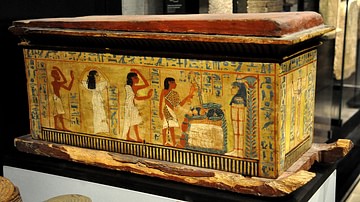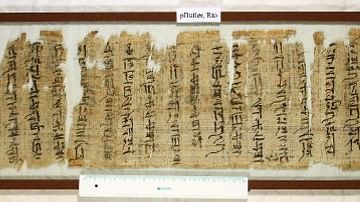Search
Search Results

Article
The Egyptian Amulet: Pious Symbols of Spiritual Life
Material Objects & Cultures Material objects convey volumes about the people who possessed them. Cultures and societies in every generation are in part classified - either correctly or incorrectly - by the objects or symbols they select...

Definition
Set (Egyptian God)
Set, also known as Seth and Suetekh, was the Egyptian god of war, chaos, and storms, brother of Osiris, Isis, and Horus the Elder, uncle to Horus the Younger, and brother-husband to Nephthys. His other consort was the goddess Tawaret, a hippo-headed...

Article
Ancient Egyptian Agriculture
Agriculture was the foundation of the ancient Egyptian economy and vital to the lives of the people of the land. Agricultural practices began in the Delta Region of northern Egypt and the fertile basin known as the Faiyum in the Predynastic...

Interview
Interview: Egyptian Mythology by Garry Shaw
World History Encyclopedia is joined by Egyptologist and author Garry Shaw to chat about his new book Egyptian Mythology: A Traveller's Guide from Aswan to Alexandria. Kelly (WHE): Do you want to start with telling us what the book is about...

Article
The Egyptian Afterlife & The Feather of Truth
Is it possible to have a heart that is lighter than a feather? To the ancient Egyptians it was not only possible but highly desirable. The after-life of the ancient Egyptians was known as the Field of Reeds, a land just like what one knew...

Article
Rome's Egyptian Heritage
The Eternal City of Rome is one of the places in the world with the most historical sites to visit. The list of ancient ruins, museums, churches, and other historical landmarks makes the city an Eldorado for anyone interested in history...

Article
Ancient Egyptian Medical Texts
Medicine in ancient Egypt was understood as a combination of practical technique and magical incantation and ritual. Although physical injury was usually addressed pragmatically through bandages, splints, and salves, even the broken bones...

Article
Ancient Egyptian Mortuary Rituals
Ever since European archaeologists began excavating in Egypt in the 18th and 19th centuries CE, the ancient culture has been largely associated with death. Even into the mid-20th century CE reputable scholars were still writing on the death-obsessed...

Article
The Eloquent Peasant & Egyptian Justice
The Tale of the Eloquent Peasant is a literary work from the Middle Kingdom of Egypt (2040-1782 BCE) which illustrates the value society placed on the concept of justice and equality under the law. In the story, a peasant named Khun-Anup...

Article
Ancient Egyptian Taxes & the Cattle Count
The gods of ancient Egypt freely gave their bounty to the people who worked the land, but this did not exempt those farmers from paying taxes on that bounty to the government. Egypt was a cashless society until the Persian Period (c. 525...